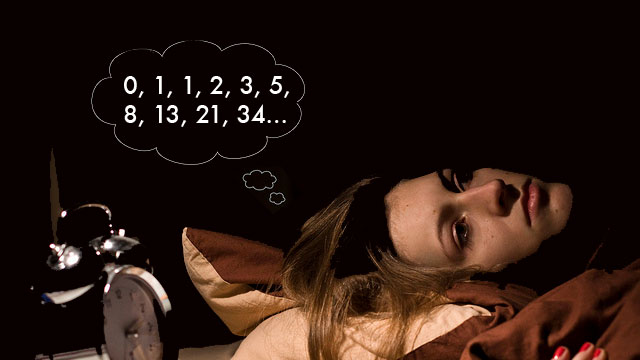We should spend about a third of our life asleep, recharging the batteries for the next day. Studies from the National Sleep Foundation (NSF) show that more than a third of us wakes up feeling unrefreshed, and almost just as many people wake up often during the night. Furthermore, 21% of us wake up too early (and then experience difficulty getting back to sleep) and/or have a hard time falling asleep in the first place.
Often when day to day problems are on your mind it can keep you awake. Such thoughts can even wake you up. Keep a pen and paper next to your bed to write down any thoughts that are going around in your head, or inspirations that you have, before you go to sleep, so you can sort it out the next day. A great way to get to sleep is to calm down and focus on something that isn't to do with your problems or the fact you're still awake.
 One method to take your mind off these problems is to do some mental arithmetic. This could be counting off the Fibonacci sequence. The Fibonacci sequence is a series of numbers starting with 0 and 1 and then each subsequent number is the sum of the previous two. So when you're counting in your head at night: Start at 0, add 1, then count adding the previous number in the sequence: 0, 1, 1, 2, 3, 5, 8, 13, 21..... Alternatively, you could try calculating your yearly income, or just counting from 100 backwards to zero visualizing the numbers starting at 100 and counting backwards, then letting the numbers fall off at around 80.
One method to take your mind off these problems is to do some mental arithmetic. This could be counting off the Fibonacci sequence. The Fibonacci sequence is a series of numbers starting with 0 and 1 and then each subsequent number is the sum of the previous two. So when you're counting in your head at night: Start at 0, add 1, then count adding the previous number in the sequence: 0, 1, 1, 2, 3, 5, 8, 13, 21..... Alternatively, you could try calculating your yearly income, or just counting from 100 backwards to zero visualizing the numbers starting at 100 and counting backwards, then letting the numbers fall off at around 80.
Try deliberately to stay awake. Sounds crazy? A recent study at the University of Glasgow, led by Niall M. Broomfield, followed two different groups of insomniacs and monitored their sleep patterns. One group was asked to lay in bed with their eyes open without any television, computers or phones, and basically asked to try to stay awake for as long as possible. That group managed to fall asleep faster every night than the other test group who used a traditional method to fall asleep. The next time you're having trouble sleeping, get comfortable, stop moving, and try to keep your eyes open. You might find that trying to stay awake is way more tiring than focusing all your energy on falling asleep.
Sometimes when you're too wound up to sleep, mental exercises just won't work. That means it's time to try some physical exercises instead. You can try pretty much any relaxation technique that works for you. This tends to mean 7/11 deep breathing exercises.
Try a 7/11 deep breathing relaxation technique
- Lie on your back.
- Slowly relax your body. Start with your feet working your way up to your head
- Begin to inhale slowly through your nose if possible. Fill the lower part of your chest first, then the middle and top part of your chest and lungs. Be sure to do this slowly, over 7 seconds.
- Hold your breath for a second or two.
- Then quietly and easily relax and let the air out over about 11 seconds.
- Wait a few seconds and repeat this cycle.
- If you find yourself getting dizzy, then you are overdoing it. Slow down.
- You can also imagine yourself in a peaceful situation such as on a warm, beech. Imagine that you rise on the gentle swells of the water as you inhale and sink down into the waves as you exhale.
- You can continue this breathing technique for as long as you like until you fall asleep.













